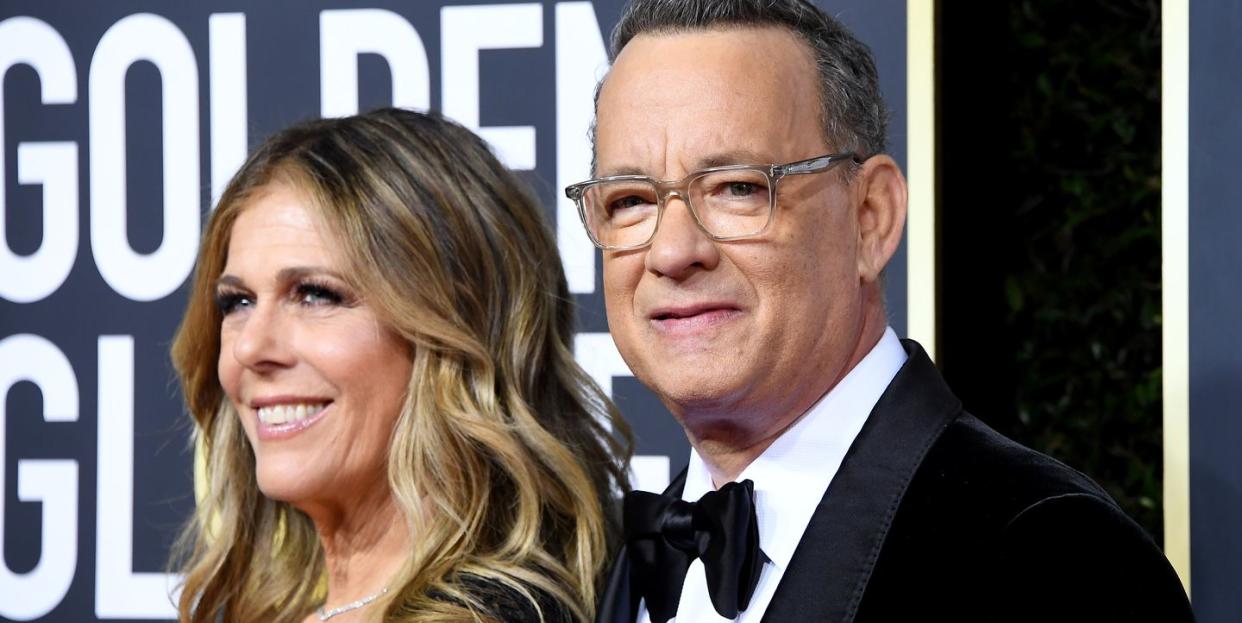Rita Wilson No Longer Has COVID-19 Antibodies 11 Months After Getting Sick

- Oops!Something went wrong.Please try again later.
After falling ill with COVID-19 mid-March, Rita Wilson says she no longer has novel coronavirus antibodies.
“I just tested two weeks ago … but it’s okay, I have a mask and I have hand sanitizer, so I’m back like everyone else,” she said.
A recent study found that COVID-19 antibodies may last at least eight months in some people.
Nearly a year after falling ill with COVID-19 alongside her husband Tom Hanks, Rita Wilson revealed she no longer carries coronavirus antibodies. After recovering, she and Hanks, both 64, participated in a UCLA study that regularly tested them for antibodies to learn more about how long they linger. For Wison, they lasted 11 months.
“Sadly, I don't have the antibodies anymore,” she said in a Feb. 1 interview on The Ellen DeGeneres Show. “I just tested two weeks ago … but it’s okay, I have a mask and I have hand sanitizer, so I’m back like everyone else.” The singer didn’t comment on her husband’s antibody results, but recalled feeling “superhero-like” when she had them.
“You kind of feel superhero-like and superhuman because you have the antibodies and you feel like you can go places and do things,” she said. “Except nobody else can go anywhere and do anything.”
DeGeneres, who recently recovered from COVID-19, noted that she’s currently fulfilling the recommended three month wait before taking the antibodies test.
In December, Wilson visited Jimmy Kimmel Live! and gave the host an elbow bump, he was unconcerned with their lack of social distance. “I feel like you’re the only person I don’t have to worry about because you must be brimming with antibodies right now,” Kimmel laughed. “I still have antibodies!” she confirmed.
Wilson went on to tell Kimmel about the UCLA study. “They test us and so far we still have them,” she explained. “They diminish as you get farther away from your infection but they’re still there helping us out.”
Back in April, Hanks shared a photo of a bag of plasma he donated to the study, and Wilson shared a snapshot of the donation process. “A photo of getting tested for antibodies in preparation of donating plasma,” she wrote. “Thank you Dr. Anne Rimoin @annierimoin at UCLA for the study you’re working on to help patients heal from COVID-19.”
As a guest on NPR’s Wait Wait... Don’t Tell Me! podcast in April, Hanks shared his hopes that their contributions will help in the development of a vaccine. “We have not only been approached; we have said, do you want our blood? Can we give plasma?” he said. “And, in fact, we will be giving it now to the places that hope to work on what I would like to call the Hank-ccine.”
Since the initial outbreak, multiple studies and doctors have explored the concept of COVID-19 immunity—the idea that the antibodies protect a once-infected person from getting sick again. And while the Food and Drug Administration (FDA) says it’s “unclear” how long the immunity lasts, a study published in November—which has not yet been peer-reviewed or published in a scientific journal—uncovered more specific findings in their sample group of 185 COVID-19 cases.
“We found that the body’s immune system remembers the novel coronavirus for at least eight months, which suggests to us that the immune system can remember the virus for years,” study co-author Shane Crotty, Ph.D., a professor in the Center for Infectious Disease and Vaccine Research at La Jolla Institute for Immunology, previously told Prevention.com. “Most likely, many people will be protected from a repeat case of COVID-19 for substantial time.”
But that doesn’t mean reinfection is impossible. According to study co-author Alessandro Sette, Dr.Biol.Sci., a professor in the Center for Infectious Disease and Vaccine Research at La Jolla Institute for Immunology, there was a variation in immunity levels among participants.
“Most people had a measurable robust immune memory but a few individuals did not,” Dr. Sette previously told Prevention.com. “We don’t know for sure yet but it is possible that at least some with particularly low immune memory could be susceptible to reinfection.” (In fact, a 25-year-old man was the first case of confirmed COVID-19 reinfection in the U.S.—only the fifth confirmed case of reinfection in the world.)
Although the data is slowly piling, coronavirus antibody research is still in early stages, which makes it difficult to make any hard claims about immunity right now. These findings and Wislon’s results, however, are providing a path to clarity.
You Might Also Like

